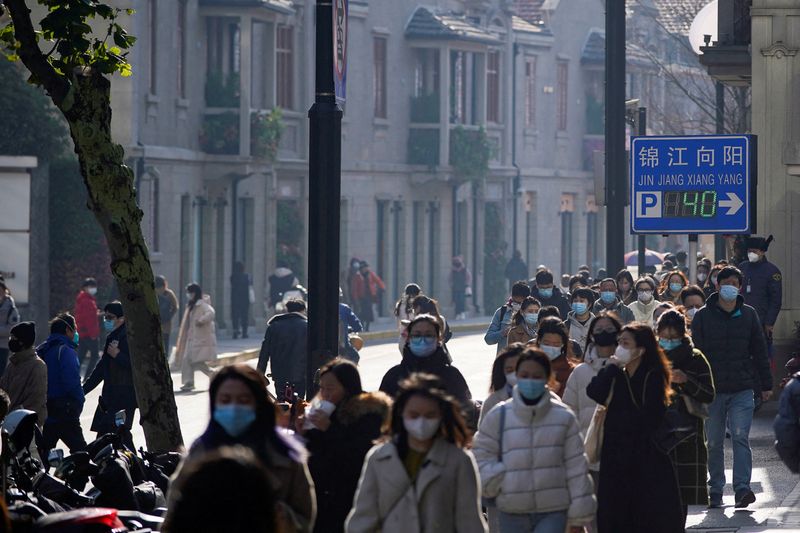By Kevin Yao
BEIJING (Reuters) -When China's leaders gather this month to set next year's economic agenda, they will likely map out more stimulus steps, eager to underpin growth and to ease disruptions caused by a sudden end to COVID-19 curbs, policy insiders and analysts said.
In three days of closed-door sessions at the annual Central Economic Work Conference, President Xi Jinping and other top officials are expected to discuss keenly anticipated growth targets, expanded fiscal spending on infrastructure and other programs, and the potential for more monetary easing.
They face a daunting challenge: The recent relaxation of China's harsh COVID-related restrictions are ushering in a surge of infections, complicated by inconsistent messaging and a fragile healthcare system.
That surge has already hit Beijing, where the start of the conference itself was delayed due to a sudden wave of COVID infections, Bloomberg News reported on Tuesday.
The conference has no publicly announced schedule but must be held by the year-end to establish policy for the new year. It had been widely expected to convene before the end of this week.
Economists and investors, struggling with a lack of reliable data on China's worsening COVID situation and keen for clarity on the economic outlook, will this year be parsing the vague policy pronouncements and patchy media leaks that follow the secretive conference for clues on how the government aims to revive growth.
"We must boost domestic demand - consumption and investment, and we need to stabilise the property sector," Zong Liang, chief of research at state-owned Bank of China, told Reuters.
China's economy - the world's second largest - grew just 3% in the first three quarters of the year and is expected to stay around that rate for the full year, well below the official target of "around 5.5%".
Growth has been depressed by COVID-related curbs that brought frequent lockdowns and both disrupted production and dampened consumer spending, compounding the effects of China's persistent property-sector crunch and a weakening global economy that hobbled the export sector.
The authorities last week abandoned key elements of their strict anti-COVID stance, spurred by the mounting economic costs and widespread public protests.
The move was welcomed by global markets for the long-term economic benefits but carries with it the short-term prospect of a surge in infections, and the pain that will bring.
COVID DILEMMA
The dilemma is not lost on China's leadership, including a new team of top economic officials selected by the party congress in October, where Xi packed top party decision-making bodies with his close allies. They will formally take office in March.
China's Politburo, a top decision-making body of the ruling Communist Party, said last week that fiscal policy would be ramped up and become more effective next year, while monetary policy would be targeted and forceful.
The central bank is likely to step up targeted support for troubled sectors through its structural tools, policy sources and analysts have told Reuters.
Government advisers told Reuters last month they would recommend the conference adopt 2023 growth targets ranging from 4.5% to 5.5%, while a central bank adviser said last month that China should set a target no lower than 5%.
Since then, proposals that China should aim for growth around 5% have gained steam in the run-up to the meeting.
"I believe we should set a growth target of above 5%," said a government adviser, who spoke on condition of anonymity because the deliberations are confidential.
"We need to step up fiscal policy and I believe next year's budget deficit ratio should be raised to at least 3%."
The budget deficit target for 2022 was set around 2.8% of GDP.
The government is likely to keep its annual inflation target unchanged around 3% next year, government advisers said.
Central bank chief Yi Gang pledged this month to focus on supporting the slowing economy, and said consumer inflation was likely to stay moderate in 2023.
Although key economic targets are expected to be endorsed at the meeting, they will not be announced publicly until China's annual parliament meeting, usually held in March.
"(Next year) will be the first year under the leadership of the new economic team after the 20th Party Congress," analysts at JPMorgan (NYSE:JPM) said in a note to clients.

"It will also be the transitional year for China's COVID policy shift."
The conference, they said, would be key not just for the growth target, but for more clues on monetary and fiscal policy, especially any shift towards transfers to households, as well as guidance on housing- and COVID-related policies.